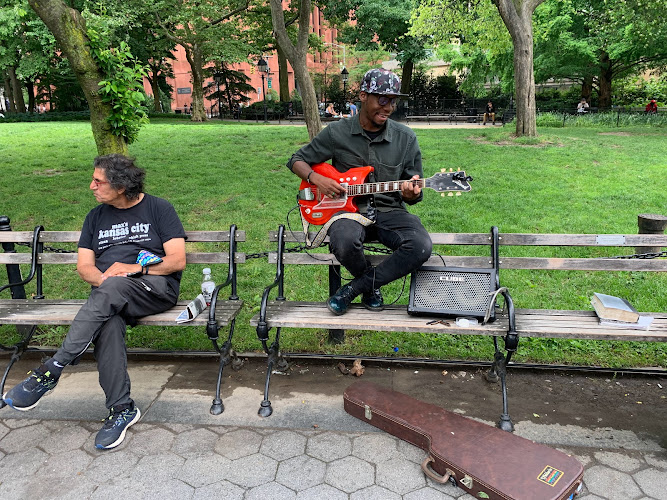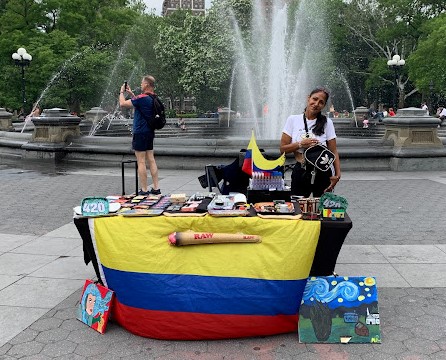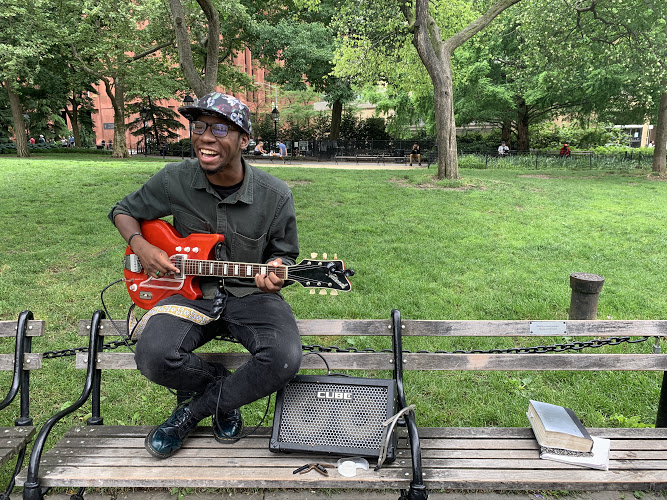BY CARMO MONIZ | Many artists and vendors in Washington Square Park, known for its popularity among artists, students and protesters, are struggling to perform and vend legally in the face of park rules. For this year through the end of May, Parks Enforcement Patrol officers issued 40 summonses for unauthorized vending in the park, compared to just three for all of last year.
The park rules, which were last modified in 2013, state that those selling art, photography, reading material and sculpture — all of which is classified as expressive matter — must leave a 12-foot-wide pathway for pedestrians when setting up their stands in the park. They must also be next to the curb unless they are selling at a marked spot, though park rules do not designate any of these spots in Washington Square Park.
“Washington Square Park is a bastion of artistic expression. We support expressive-matter vendors performing in parks, following long-standing related rules,” Megan Moriarty, a press officer for the Parks Department, said. “Our PEP officers’ first course of action is to educate parkgoers to our rules; if not followed, the next step would be to issue a summons, and only in extremely rare circumstances would we effectuate an arrest.”
Expressive-matter vendors cannot occupy a space larger than 8 feet long by 3 feet wide parallel to a path or curb, and their stands must be from 2 to 5 feet high. Vendors must also be more than 5 feet from any park or street furniture — such as benches and light fixtures — and be more than 50 feet away from public art installations and monuments, including fountains.
The width of the pathways in Washington Square Park, lack of designated selling spots and the placement of park furniture and art installations, including the fountain near its center, provide an obstacle for vendors to set up legally. In addition to the potential consequences of a summons and arrest, artists and vendors in violation of park rules must pay a civil penalty, which may be recovered in proceedings with the Office of Administrative Trials and Hearings a.k.a. OATH.

Expressive-matter vendors can face penalties ranging from $500 to $750, and the penalty is the same for unauthorized music or noise for commercial purposes. Aaron Gamman, who has been playing guitar in the park for the last three years, said that he has been shut down as well as threatened with the seizure of his guitar and arrest by park authorities.
“It seems like a little tiny war going on between the people who frequent the park and the authorities, and it’s so strange what they choose to settle on — what’s going to make the park better — because right now, they’re really focused on amplification, no amps whatsoever, because they don’t want noise complaints,” Gamman said. “I’ve been here for three years and there’s so many people overdosing and dying over there and in the bathrooms, but they’re choosing to harass a bunch of artists and musicians in the name that it’ll look like they’re doing good.”
In several other major parks, such as Central Park, Battery Park and Union Square Park, there are designated spots — marked by medallions — on which expressive-matter vendors are allowed to sell. In Central Park there are also additional areas that do not require vending at a designated spot. In Washington Square Park, however, the absence of these medallion-marked spots leaves vendors to work with limited space due to distance regulations.
In 2010, Robert Lederman, the founder of Artists’ Response to Illegal State Tactics (A.R.T.I.S.T.), sued the city’s Department of Parks and Recreation over the rules, arguing that they were unconstitutional because they were content based — as in, based on the substance of what was being communicated by vendors. In 2013, however, the U.S. Court of Appeals, Second Circuit ruled that the regulations were constitutional, allowing them to stand.
“The City Council could make a new law,” Lederman said. “They certainly won’t because they turned over the parks to all the park conservancies. The Parks Department could make a new law, but they’re certainly not going to do it: Their whole plan is to turn every park into a park conservancy and wash their hands of the whole thing.”
Lederman blasted the Washington Square Park Conservancy for trying to control the park.
“That conservancy is violating the entire spirit of what a public park is,” he said. “They try to organize their own shows, their own performances, their own everything there — it’s all about a handful of rich people that live near the park.”

A report by Gothamist in late March found that members of the Washington Square Park Conservancy, which is not supposed to participate in planning, policy or the creation of events, called for some park events to be eliminated and for the enabling of private programming in public spaces. The same report found that park administration had consulted with the group in a decision to block off the drug-plagued northwest corner of the park and reserve it for conservancy programming.
Lederman also said that inconsistent enforcement of park regulations is confusing artists and vendors in terms of what they can and cannot do, and that enforcement is dependent on reports from others who occupy the park.
“There could be 500 vendors in a park, but if nobody’s complaining, nothing’s gonna happen,” he noted. “So there’s no consistency in the way the enforcement’s done, and it actually encourages vendors, artists, performers, to ignore the rules because the rules are enforced so sporadically. You could be in Washington Square Park for a month, violating every single park rule, and nothing will happen to you — and then, all of a sudden, every day you’ll be given a summons or arrested.”
Anyone in the park selling nonexpressive-matter goods needs a vending permit from the Parks Department. Those found vending without a permit can face a penalty of up to $375 for having a stand and up to another $375 for unlawful vending, with the unlawful vending penalty rising to $500 to $750 for a subsequent violation within the year. The sale of marijuana and alcohol is also prohibited in the park, though some vendors sell them.
“I don’t want to be a target to the cops. You’ve got to respect them when they come and tell you, ‘Listen for the day you can’t work’ — so just leave, you could always make money tomorrow,” said Innddia Rojas, who has been vending in the park for two months. “Half of the people that didn’t leave yesterday, today, they’re gonna mess with them because they stood, they didn’t follow orders. When you want to do something, especially if you know you’re not legal, the only thing you gotta do is follow some orders and you’ll be under the radar.”
Lederman added that the history of free expression in the park contributes to artists’ and vendors’ ability to remain there despite regulations.
“You can talk to people in China, Japan, Korea, Africa, they all know Washington Square Park. They know what went on there, they know Bob Dylan played there,” Lederman said. “If the city tried to get rid of everybody there, there’d be just a massive outcry and it would result in some politician probably getting voted out of office. That’s the reason that they let what goes on there go on — but again, none of it’s legal according to the park rules.”


The PEP Officers should give out 100 summons every day…Motorcycles, motorized scooters and bicycles speeding through the Park… Hard Drug Dealers are ignored by PEP Officers…. Addicts shooting Up, Smoking Crack and Selling Stolen Merchandise Ignored by PEP Officers… The Park Conservancy has Ceded part of the Park to Addicts & Dealers… Unhealthy and Dangerous to the Community…. 6th Precinct Captain says most Crime in the Area surrounding the Park originates in WSQ Park.
You should apply for PEP. I heard they are understaffed, you can get all the bikes and motorcycles ur complaining abt. And summons the homeless people and when they dont have ID what will you do. Officer Hill? Help the community!!
But you can sell/smoke/inject any hard drugs or vend stolen goods as much as you like at the Northwest and Southwest Corners without any consequence.
Park Management is a joke, CB2 Parks Committee is a joke, PEP is a joke, NYPD enforcement is a joke, the DA’s and Judges’ criminal prosecution are jokes. And the mayor has “swagger”!
Glad to see this creates fodder for The Village Sun to so aptly write about. At least someone is making a legitimate dollar selling advertising and making contribution to the economy!
LOL! That sums it up…
And don’t forget “bail reforms daddy” Brad Hoylman and the rest of the local elected representatives. Too busy doing photo-ops than to hear the voices of local peeps. Maybe they can bring their kids to the park too and dodge needles in the grass like we do with our kids at our play dates. Parents Unite!
Not seeing why it is OK for a park to be used for capitalism? Because that is ultimately what “vending” is, whether pot or cool sneakers or whatever.
New Yorkers pay taxes, which go to things like parks, trash pick-up, rat abatement, public schools, programs for low-income residents etc — not to enable vending in green spaces.
(Not to mention the “vending” results in more trash/environmental impact)
To add further confusion to the WSP vending issue, Mayor Adams has explicitly endorsed illicit sidewalk and park weed sales.
“With marijuana possession now legal, police are focusing on other types of crimes in the city, The Daily News reported. In the interim, Adams said that he doesn’t see a need for ‘cracking down on anyone caught dealing marijuana out of stores or on the street’ in the interim.”
Considering that it is illegal to sell anything in parks or on the street without a vending license or park permit (artists and written-matter vendors are exempted from the requirement) that he’s encouraging weed sales yet wants vendors removed from the streets and parks and relocated to parking lots (SEE: https://patch.com/new-york/chelsea-ny/fake-consensus-driven-street-vendor-advisory-board-report-nodx) is truly absurd.
Washington Square Park is a PARK, not a performance facility or a retail space. It should not be turned into yet another commercial venue to sell stuff (art, music, weed, crafts, etc.) since our City has plenty of stores and clubs and galleries already, and very, very few parks. The Park should be preserved as a public green space where one can connect with nature, find some quiet in an otherwise noisy town, smell the flowers, listen to the birds, quietly read a book or chat with a friend, etc. No one using the Park has the right to interfere with other users (so no smoke, no excessive noise, etc.) The idea that the Park’s purpose is to promote “artistic expression” is absurd and serves only those who aim to make money for themselves. “The authorities” should enforce laws that help to maintain the Park’s mission: to provide a green space for the citizens of New York City.
And by the way, Bob Dylan did not play in Washington Square Park!
From: Hague v C.I.O. US Supreme Court 1939: “streets and parks have immemorially been held in trust for the use of the public and, time out of mind, have been used for purposes of assembly, communicating thoughts between citizens, and discussing public questions.” Further, the court found “regulation of speech on government property that has traditionally been available for public expression is subject to the highest [judicial] scrutiny.” Specifically, the court noted “[s]uch regulations survive only if they are narrowly drawn to achieve a compelling state interest.” Also note that the WSP Conservancy is sponsoring all kinds of events, performances, art shows, etc.
Selling weed and paraphernalia, jewelry, used clothing, art and musical performances, is not “communicating thoughts between citizens, and discussing public questions.” It is commerce, plain and simple. If the vendors and artists were sharing their products for free, then MAYBE they would qualify under this ruling (though amplified music makes for a pretty one-sided “discussion”). But they are not — they are taking advantage of the free audience and public space that the park provides by using the park as a storefront, gallery and concert venue so they can make money. This is a poor use of our public park and needs to stop.
The sale of protected materials is also protected. See Lakewood v. Plain Dealer Pub. Co., 486 U.S. 750, 756 n. 5 & 768, 108 S.Ct. 2138, 2143 n. 5 & 2150, 100 L.Ed.2d 771 (1988)
Amen! A park is supposed to be peaceful. It doesn’t have to be silent, but it certainly shouldn’t be a turned into a flea market with everyone blasting their music over each other. It is not large enough to accommodate the number of gypsies that currently take up residence there. There is a balance, and it’s way out of balance at the moment.
^ Definitely one of the neighbors who think the park belongs to them and not the people of New York City
A well-written and well-researched article on vending, which is a rarity in NY media. One point of clarification: The 2010 lawsuit was lost solely because the lawyers representing the Parks Dept (NYC Corporation Counsel lawyers and Parks Dept lawyers) committed perjury throughout the case. They consistently lied to the judge in oral arguments and in their legal briefs about what the rules were, how they were created, who they affected and why Parks created them at the demand of park conservancies. They got every City official who testified to also commit perjury. They literally lied about the actual text of the rules, including how wide a sidewalk had to be to allow legal vending. We brought the perjury accusations to the judge numerous times. He completely ignored all the evidence, which was massively damaging to the City. Noting the obvious animus on the City’s part toward the plaintiffs and despite ruling against us, the judge noted in his ruling that the City created the rules specifically to counteract the court rulings that A.R.T.I.S.T. had won in previous lawsuits that made selling art on the street and in parks a First Amendment activity. The reason the Parks Enforcement Patrol officers, the Washington Sq. Park Conservancy and the Parks Dept don’t consistently enforce the vending rules in WSP is that if they did, not one artist, performer or musician could legally work there, and the conservancy would then be exposed as the enemy of artistic expression and First Amendment freedom that it really is. Park conservancies are the enemy of free expression. They privatize and steal the public’s parks.
Robert Lederman,
president, A.R.T.I.S.T.